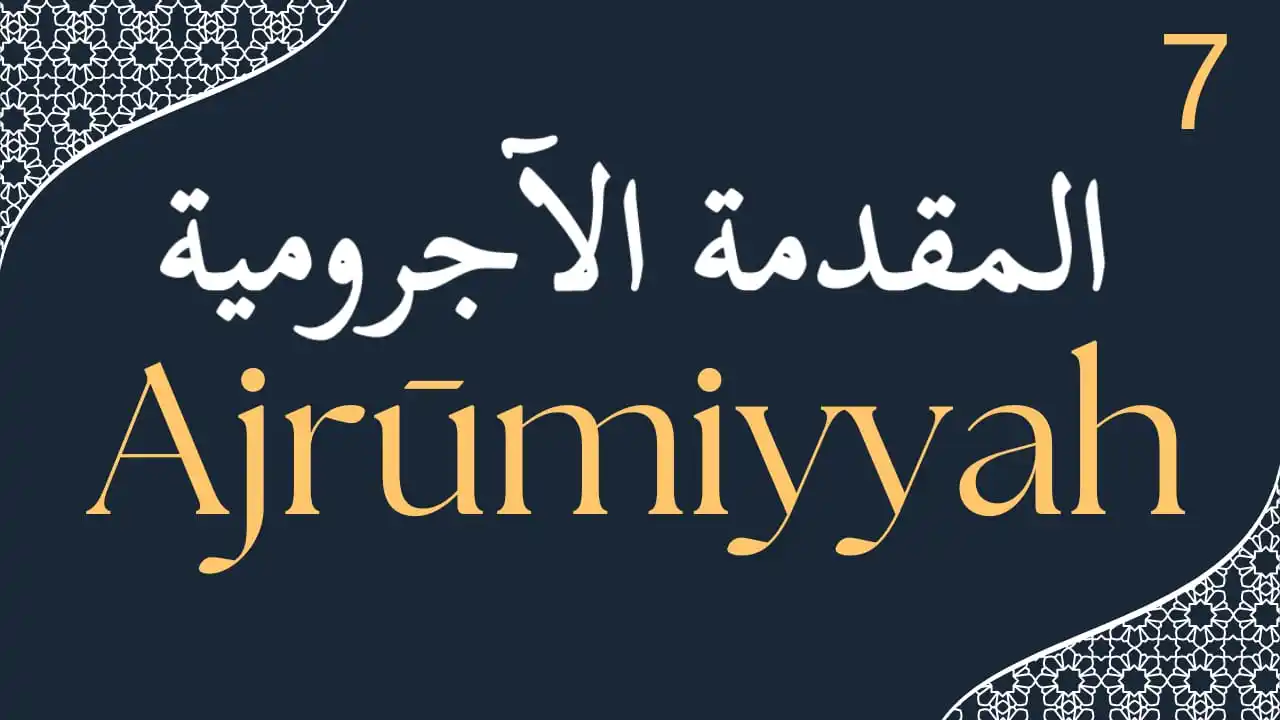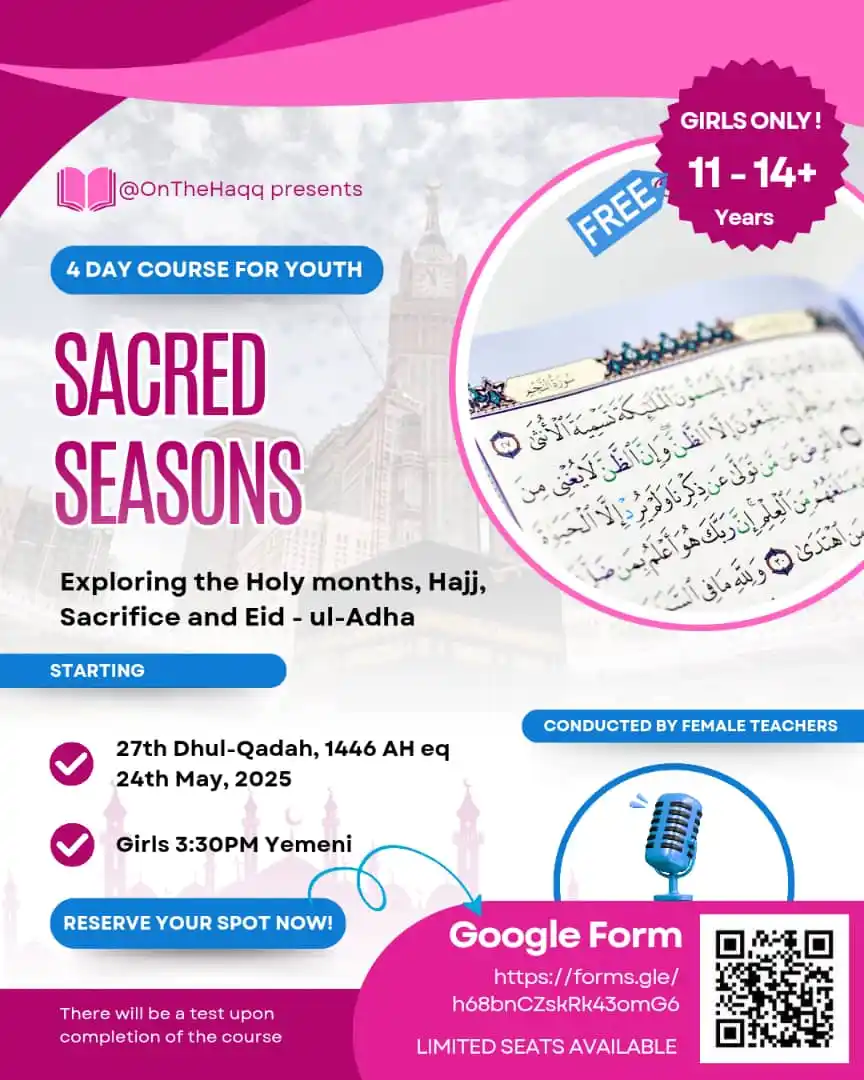
Madrasatuna
5.5K subscribers
About Madrasatuna
𝗚𝘂𝗶𝗱𝗮𝗻𝗰𝗲 is not attained except with 𝗸𝗻𝗼𝘄𝗹𝗲𝗱𝗴𝗲 Main channel: https://t.me/madrasatuna Arabic vocab: https://t.me/mufradaatun Sister channel: https://t.me/womensbenefits Manhaj benefits: https://t.me/almanhajussalafi Videos: https://t.me/Salafirecords Ruqya channel: https://t.me/ruqyachannel 𝙔𝙏. https://youtube.com/c/Madrasatuna 𝐄𝐦𝐚𝐢𝐥: [email protected]
Similar Channels
Swipe to see more
Posts

*Ajrumiyyah | Lesson 7 | المقدمة الآجرومية* ⤵️ https://youtu.be/fUaRf8Q5qgo #Ajrumiyyah #الآجرومية


DISCLAIMER! After returning from Yemen, I began offering free classes to the community at Masjid Ummul Qura. However, when I observed the owner redirecting the da'wah in a direction I couldn't support, I decided to step away. Unfortunately, the masjid has since experienced a decline, hosting questionable speakers and engaging in concerning activities. I felt it important to clarify my stance in case anyone still believes I’m affiliated with the masjid. Abu Ishaq Muhammad 23 Dhuʻl-Qiʻdah 1446 AH

BENEFIT 469: Responding to Evil: The Obligation of the Student of Knowledge Shaykh Ibn Bāz (may Allāh have mercy on him) said: "Then the student of knowledge must be extremely keen not to conceal anything of what he has learned." Sheikh Yusuf Al-Jazaa'iri comments: This is a precious statement, and we shall now reflect upon it. It is a valuable piece of advice from Imām Ibn Bāz (may Allāh have mercy on him) to the student of knowledge. Sheikh ibn Baz: "He is keen to clarify the truth and to refute the opponents of the religion of Islam" Commentary: Whether they are disbelievers, atheists, or people of innovation and misguided desires, or those characterized by wickedness. The adversaries of Islam vary in their hostility: {You will not find a people who believe in Allāh and the Last Day having affection for those who oppose Allāh and His Messenger} — each according to the nature and degree of his opposition and hostility. Sheikh Ibn Baz: "He is not negligent nor withdrawn; rather, he is always present in the field of action to the best of his ability." Commentary: A student of knowledge, even though he may not yet be a scholar, must not refrain from clarifying the truth and refuting falsehood. He bears responsibility for conveying the truth, but this is bound by his capacity and knowledge. He should not speak on matters beyond his understanding, but he must respond to the people of falsehood and expose their misguidance. In some cases, if there are no scholars present in his locality, it may become incumbent upon him to act as a scholar, being a representative and inheritor of the scholars. Sheikh Ibn Baz: "He does not withdraw but remains visible in the field of duty, to the extent of his ability. If the opponents of Islam begin to cast doubts and attack, he steps forward to respond—whether in writing, in speech, or by other means." Commentary: This is a refutation of those who try to restrict the role of the student of knowledge, saying to him: “Do not respond, do not clarify the truth, do not refute the people of falsehood.” This is incorrect! Rather, the student is advised: “Clarify the truth, but do not exceed your limits. Speak with knowledge. If you have evidence, present it. If not, convey the statements of the scholars.” 📌 This is a great responsibility for the student of knowledge—that he spreads the words of the scholars and explains them to the people. Not everyone has the means to access the statements of scholars, so the student serves as a bridge between the scholars and the general public, delivering their words and teachings. Sheikh Ibn Baz: "He steps forward to respond—in writing, speech, and other forms—and he does not show complacency or say: ‘This is for someone else to do.’" Commentary: This is a serious error. Many people, upon witnessing falsehood, evil, or its propagation, excuse themselves by saying, “This is not my responsibility; I am not a scholar.” What is the result? Falsehood continues and spreads unchecked. This leads to greater harm than if he had spoken. No one is permitted to witness falsehood without clarifying the truth, but this must be done within the bounds of one’s knowledge and ability. Sheikh Ibn Baz: "Rather, he should say: ‘I am responsible for this. I will address it. I will handle it.’" Commentary: The student of knowledge must be in the front lines. Even if there are other scholars present, he should fear missing the opportunity to address the issue. Indeed, there may be scholars more knowledgeable than him, but as the scholars have stated: “Delaying the clarification when there is a need is not permissible.” This is a principle. Not every falsehood requires waiting to consult scholars—if one possesses knowledge on the matter and has the evidence and proofs, then he is a representative of the scholars. He has not exceeded their boundaries but is conveying their message to the people and presenting the evidences while refuting falsehood.

📌 Ibn Taymiyyah رحمه الله said: ✍🏻 “When people cooperate in sin and transgression, they end up hating one another.” 📖 Majmu‘ al-Fatawa (15/128) Join & Share https://t.me/Alquut/1187

𝗪𝗼𝗺𝗲𝗻'𝘀 𝗕𝗲𝗻𝗲𝗳𝗶𝘁𝘀 (388) Consider This Before Handing Over Your Phone for Repair Sheikh Fat-h Al-Qadasi hafidahullah says: This is a brother drawing attention to an important matter: some women may take their mobile phones for repair, and the phones may contain private images. The technician may then copy these images and use them to threaten or blackmail the owner. This indeed does happen. For this reason, it is not just recommended but obligatory for those working in mobile phone repair and software services to uphold the highest levels of trustworthiness. If honesty is required from everyone involved in buying and selling, then those in this profession are required to carry not just one trust, but ten, due to the serious risks involved. They must fear Allāh, the Almighty, regarding the phones entrusted to them. People’s phones contain private information and secrets. It is absolutely impermissible for them to copy or extract anything from a phone—whether with the intention of blackmail or even without that intention. Even if the purpose is merely to browse or view the images, it remains strictly forbidden and unlawful. When a phone is handed over to a technician, it is an amānah (trust), and it is a religious obligation upon him to fear Allāh regarding that trust. Furthermore, it is also the responsibility of the state to enforce strict oversight over those involved in phone repair and programming. There must be strong regulatory control and firm, deterrent punishments for anyone who violates people’s trusts. And Allāh is the One Whose help is sought. Source: https://t.me/womensbenefits/872

BENEFIT 470: Repairing Manhaj Flaws Painting over manhaj flaws may create an illusion, but the structural problems will remain—and grow. Manhaj flaws are repaired through: Repentance, rectification and clarification, as Allāh said: ﴿إِلَّا ٱلَّذِینَ تَابُوا۟ وَأَصۡلَحُوا۟ وَبَیَّنُوا۟ فَأُو۟لَـٰۤئكَ أَتُوبُ عَلَیۡهِمۡ وَأَنَا ٱلتَّوَّابُ ٱلرَّحِیمُ﴾ "Except for those who repent and correct themselves and make evident [what they concealed]. Those - I will accept their repentance, and I am the Accepting of Repentance, the Merciful." [Surah Al-Baqarah: 160] Manhaj Flaws are not remedied by falsely affiliating with scholars who, in reality, refute those very flaws. They are not corrected through negligence or a careless approach to the truth. They are not repaired by falsely accusing those who bring the flaws to your attention. Nor are they fixed by chasing validation in order to mask over them.

Following Lowly Desires (1) Sheikh Al-Islam Ibn Taymiyyah (may Allāh have mercy on him) said: «وصاحب الهوى يعميه الهوى ويصمه، فلا يستحضر ما لله ورسوله في الأمر ولا يطلبه، ولا يرضى لرضا الله ورسوله، ولا يغضب لغضب الله ورسوله، بل يرضى إذا حصل ما يرضاه بهواه، ويغضب إذا حصل ما يغضب له بهواه، ويكون مع ذلك معه شبهة دين أن الذي يرضى له ويغضب له أنه هو السنة، وهو الحق، وهو الدين، فإذا قدر أن الذي معه هو الحق المحض دين الإسلام، ولم يكن قصده أن يكون الدين كله لله، وأن تكون كلمة الله هي العليا، بل قصد الحمية لنفسه وطائفته أو الرياء، ليعظم هو ويثنى عليه، أو لغرض من الدنيا لم يكن لله» “The person driven by desire is blinded and deafened by it. He neither recalls what Allāh and His Messenger have commanded regarding the matter, nor does he seek it. He is not pleased by what pleases Allāh and His Messenger, nor is he angered by what angers Allāh and His Messenger. Rather, he is pleased when his personal desires are fulfilled, and angered when they are not — all according to his whims. Despite this, he may carry with him a mistaken notion that what he is pleased with and angered by is in fact the Sunnah, the truth, and the religion. Even if what he holds is pure truth and the very essence of Islam, if his intention is not to make the religion entirely for Allāh and to elevate the word of Allāh above all else, but rather to defend himself, his group, or to show off — seeking praise and recognition — or for some worldly gain, then it is not truly for Allāh.” [Minhāj As-Sunnah An-Nabawiyyah, 5/256] #Salafi_quotes













